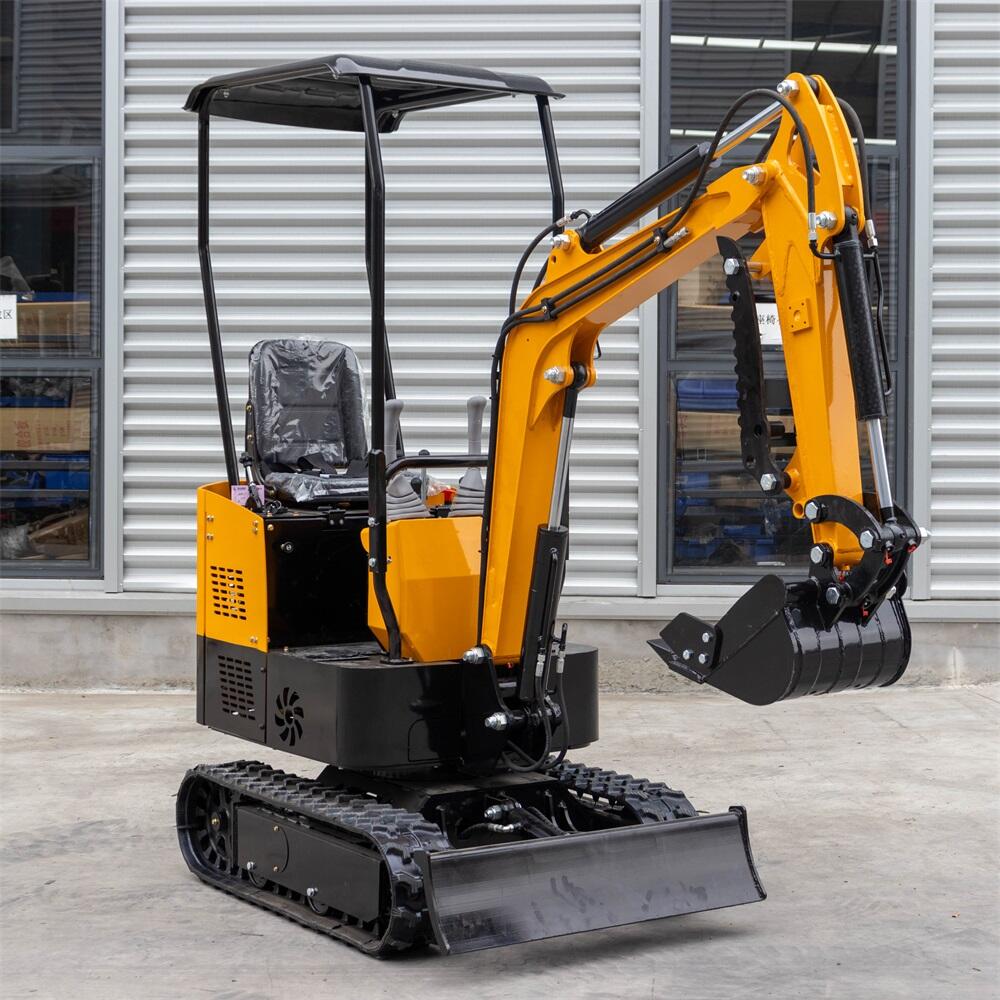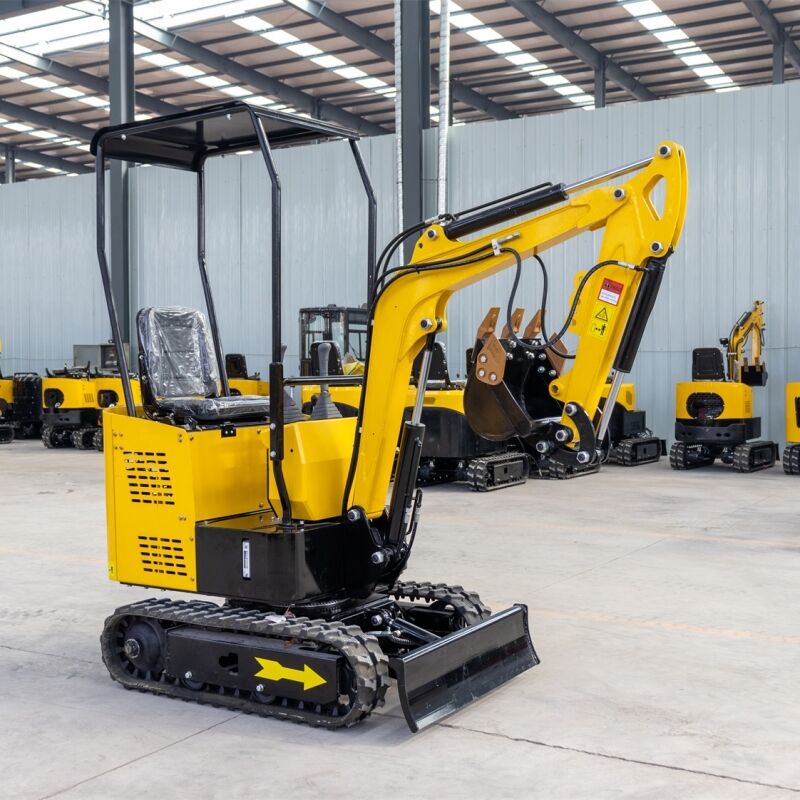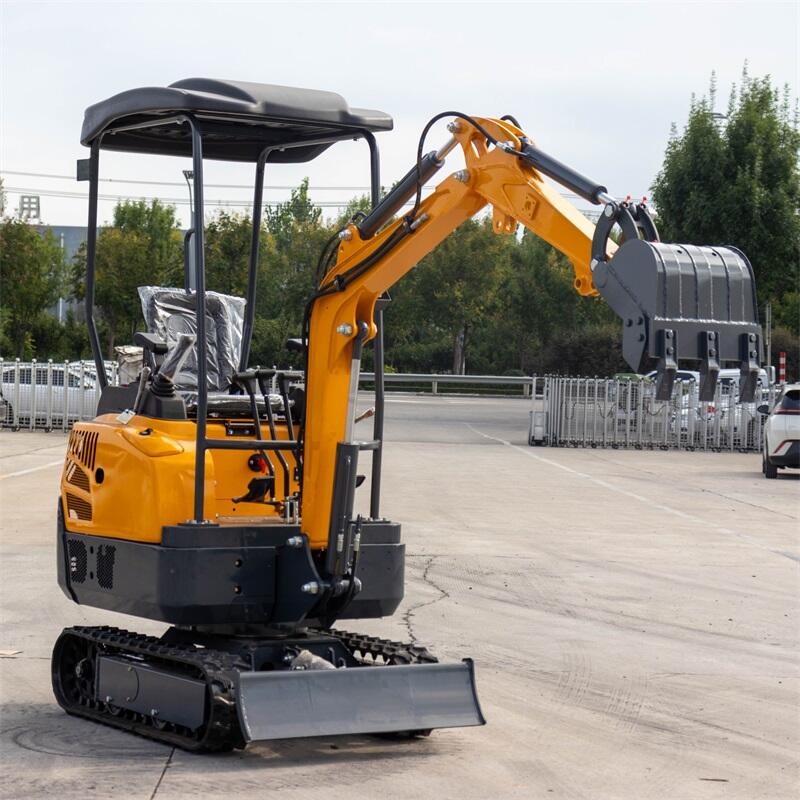Compact Hydraulic Excavators: Power Meets Maneuverability
Essential Features of Compact Hydraulic Excavators
Hydraulic Power & Precision Control
Compact hydraulic excavators depend on hydraulic power for all those heavy-duty jobs like digging, lifting materials, and moving around construction sites. The whole machine basically runs on this system to get things done right. Take a look at recent models and we see better efficiency in how they handle different specs, especially when it comes to lifting capacity measured in tons. What makes these machines stand out is their ability to do精细 work thanks to improved hydraulics. Operators can now tackle complex jobs with much greater control than before. This matters a lot during delicate operations such as digging trenches for foundations or installing underground utilities. Machines like the Komatsu PC35MR-3 show just how far we've come, giving crews amazing control even in tight spots where space is limited. Of course, there are still some constraints depending on the job site conditions, but overall these improvements make a real difference in day-to-day operations.
Compact Design for Tight Spaces
Hydraulic excavators come in compact versions that work really well in tight spots like city construction zones or landscaping jobs where there just isn't much room to move around. The smaller size helps with getting these machines from place to place and makes them easier to handle on site without making them any less powerful. Manufacturers actually shrink down the width and height so they fit through narrow alleys and under low clearance points. Take rehab work in neighborhoods for instance. These little guys can get into backyards without tearing up driveways or sidewalks. Look at Komatsu's mini models specifically. They pack all the digging power needed for serious work but still manage to squeeze through spaces that would stop regular sized equipment dead in its tracks.
Multi-Functional Attachment Compatibility
Compact hydraulic excavators really shine when paired with all sorts of mini attachments including buckets, hydraulic breakers, augers, and even snow plows. The ability to switch between these tools turns what might otherwise be just another digger into something far more useful around job sites. Workers don't have to drag multiple machines back and forth anymore which saves both time and money. Contractors who actually use these attachments report finishing jobs faster than expected based on field reports from construction crews nationwide. A single unit can handle everything from basic digging operations right up through breaking apart concrete structures, so it makes financial sense for any project needing several different functions. Machines equipped this way stay relevant longer because they keep delivering value no matter what kind of work comes along next season.
Versatile Applications in Urban & Agricultural Settings
Landscaping & Trenching
When it comes to landscaping work, mini excavators really shine because they can navigate tight spaces and handle delicate operations. Landscapers find these machines incredibly useful for all sorts of jobs from basic digging and planting trees to crafting detailed garden layouts that would be tough with bigger equipment. What makes them stand out is their ability to dig trenches quickly, which means installing irrigation pipes and setting up proper drainage becomes much faster no matter what kind of ground conditions exist. Looking at recent market trends shows that more businesses are turning to these smaller excavators for their landscaping needs. Sales figures tell us there's been a noticeable jump in revenue for companies offering compact excavation services over the past few years. As landscapes become more complex and property owners demand better results, these little workhorses continue to prove why they're becoming essential tools for modern landscaping operations.
Utility Installation in Confined Areas
Utility companies working on pipeline and cable installations in crowded city areas tend to reach for compact excavators most of the time. These machines pack enough punch despite their small size, making them ideal for squeezing through narrow alleys and around existing structures. Real world experience shows that switching to compact models cuts down installation time significantly in urban settings. Some reports even mention reductions of around 30% when compared to traditional equipment. For contractors dealing with limited space and tight deadlines, this kind of performance boost means real money saved and jobs finished faster without compromising quality standards.
Farm & Construction Site Versatility
On farms, those little excavators have become real workhorses for jobs like planting crops, digging holes for structures, and clearing land before planting season starts. Farmers also find them super helpful around construction sites where they can move tons of dirt or debris without breaking a sweat. According to some recent market analysis, when farmers start using these compact machines regularly, their overall productivity jumps quite a bit while the time spent on daily operations drops noticeably. The bottom line is simple math really saves money in the long run which explains why so many growers now consider mini excavators essential equipment for both traditional agriculture and contemporary building projects across rural areas.
Hightop Compact Excavators: Power Meets Innovation
HT10H 1-ton: Tailless Slewing & Multifunctional Attachments
What makes the HT10H mini excavator stand out is its tailless design which really boosts how well it can move around and get the job done in tight spots. Operators find themselves able to navigate through narrow alleys and crowded worksites without constant repositioning, something that becomes a lifesaver during city landscaping jobs or when working on construction sites squeezed between buildings. Beyond just being small enough to fit where others won't go, this machine comes equipped with all sorts of attachments that let it handle everything from digging trenches to leveling ground surfaces. The hydraulic system inside delivers consistent pressure throughout operations while maintaining impressive fuel efficiency numbers. For contractors dealing with varied terrain conditions day after day, these features combine to make the HT10H a reliable workhorse across multiple job sites.
HT12 1.2-ton: Kubota Engine & Swing Boom Flexibility
The HT12 model has a Kubota engine under the hood that operators love for being tough and getting good gas mileage. With this strong powerplant, the excavator really shines on job sites. The machine also includes smart design touches like the swing boom which gives workers extra freedom when doing things like leveling ground or making those tricky precision digs around pipes and cables. Many people who've used the HT12 talk about how versatile it is, especially when working in tight city spaces or setting up underground utilities. The way it saves fuel combined with how easy it is to move around makes this machine stand out for jobs where careful, detailed work matters most.
HT15Pro 1.5-ton: Rubber Tracks & Hydraulic Pilot Controls
Built to handle all sorts of terrain, the HT15Pro really stands out thanks to those rubber tracks which keep things stable without damaging the ground underneath. Landscapers love this machine because it works great on sensitive areas like flower beds or lawns that need careful treatment, plus it handles muddy spots and soft soil without sinking in. Speaking of controls, the hydraulic pilot system deserves mention too since it gives operators pinpoint control when moving around tight spaces or navigating tricky paths. Most people who work with this equipment day in and day out will tell anyone willing to listen how dependable the HT15Pro actually is. Even after years of tough jobs in different conditions from rocky hillsides to wet meadows, these machines just keep going strong without missing a beat.
Choosing the Right Mini Excavator for Your Project
Evaluating Engine Power & Hydraulic Efficiency
Picking out a mini excavator? Engine power matters a lot because it basically tells what kind of work the machine can actually do. Machines with stronger engines tackle tougher jobs without breaking a sweat, which means better results whether we're talking about construction sites or landscape projects around town. Then there's the matter of hydraulics. How well these systems work makes all the difference in how smoothly everything runs day to day. Good hydraulic systems let operators control things more precisely while burning less fuel at the same time. That means saving money on operating costs over time. Most contractors check industry standards when figuring out what power specs they need for their particular job site conditions. This ensures whatever excavator gets chosen will perform exactly as needed without falling short when push comes to shove.
Assessing Track Type & Ground Adaptability
The type of tracks fitted on a mini excavator makes a big difference in how well it performs on different kinds of ground. When picking between rubber and steel tracks, operators need to consider what kind of surface they'll encounter most often during jobs. Mud, gravel, and concrete each present their own challenges. Rubber tracks tend to grip better without tearing up soft earth, something many contractors have noticed when working on landscaping projects where preserving the surrounding area matters. Getting the right track for the job site isn't just about performance though. Proper selection also means less stress on equipment components over time, which translates into fewer repairs needed throughout the machine's lifespan and ultimately saves money while keeping projects moving forward smoothly.
Budget Considerations & After-Sales Support
When picking out a mini excavator, money matters should come first because they really shape what features and brands end up getting considered. The sticker price isn't everything though; think about all the money spent throughout the machine's life including how well it runs day to day and how long it lasts before needing replacement parts. Good customer support makes a big difference for those ongoing expenses too. Companies with solid maintenance programs help protect the purchase from unexpected breakdowns down the road. Looking at different warranty options between brands often shows where companies fall short or excel when it comes to post-sale service. A decent warranty gives operators something to fall back on if problems arise, and honestly shows that the maker believes their equipment can stand up to real world conditions without constant fixes.




